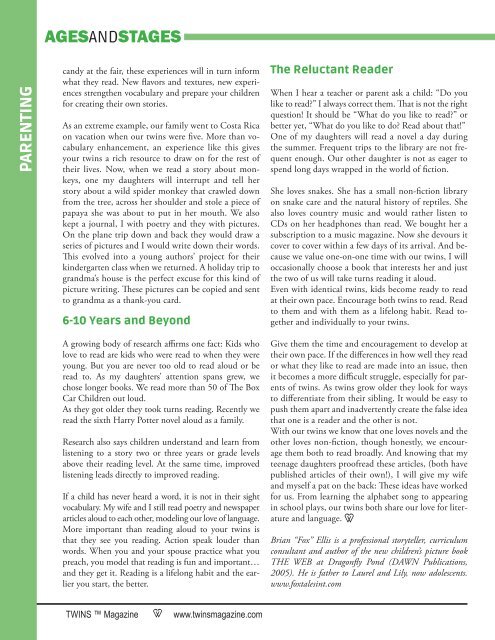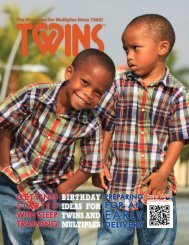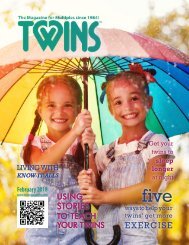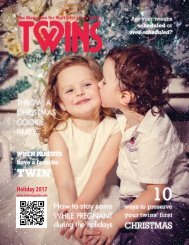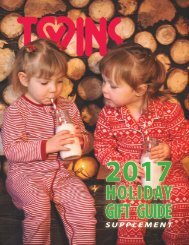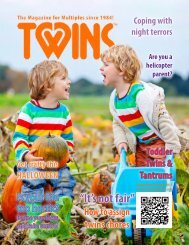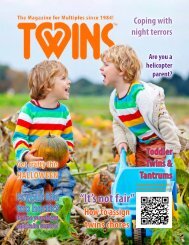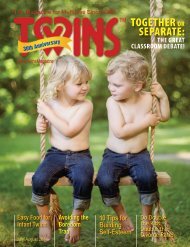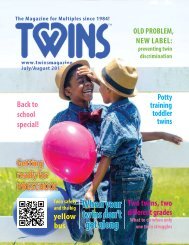2019_JulAugNEW
You also want an ePaper? Increase the reach of your titles
YUMPU automatically turns print PDFs into web optimized ePapers that Google loves.
AGESANDSTAGES<br />
A TWINS Magazine<br />
PARENTING<br />
candy at the fair, these experiences will in turn inform<br />
what they read. New flavors and textures, new experiences<br />
strengthen vocabulary and prepare your children<br />
for creating their own stories.<br />
As an extreme example, our family went to Costa Rica<br />
on vacation when our twins were five. More than vocabulary<br />
enhancement, an experience like this gives<br />
your twins a rich resource to draw on for the rest of<br />
their lives. Now, when we read a story about monkeys,<br />
one my daughters will interrupt and tell her<br />
story about a wild spider monkey that crawled down<br />
from the tree, across her shoulder and stole a piece of<br />
papaya she was about to put in her mouth. We also<br />
kept a journal, I with poetry and they with pictures.<br />
On the plane trip down and back they would draw a<br />
series of pictures and I would write down their words.<br />
This evolved into a young authors’ project for their<br />
kindergarten class when we returned. A holiday trip to<br />
grandma’s house is the perfect excuse for this kind of<br />
picture writing. These pictures can be copied and sent<br />
to grandma as a thank-you card.<br />
6-10 Years and Beyond<br />
A growing body of research affirms one fact: Kids who<br />
love to read are kids who were read to when they were<br />
young. But you are never too old to read aloud or be<br />
read to. As my daughters’ attention spans grew, we<br />
chose longer books. We read more than 50 of The Box<br />
Car Children out loud.<br />
As they got older they took turns reading. Recently we<br />
read the sixth Harry Potter novel aloud as a family.<br />
Research also says children understand and learn from<br />
listening to a story two or three years or grade levels<br />
above their reading level. At the same time, improved<br />
listening leads directly to improved reading.<br />
If a child has never heard a word, it is not in their sight<br />
vocabulary. My wife and I still read poetry and newspaper<br />
articles aloud to each other, modeling our love of language.<br />
More important than reading aloud to your twins is<br />
that they see you reading. Action speak louder than<br />
words. When you and your spouse practice what you<br />
preach, you model that reading is fun and important…<br />
and they get it. Reading is a lifelong habit and the earlier<br />
you start, the better.<br />
The Reluctant Reader<br />
When I hear a teacher or parent ask a child: “Do you<br />
like to read?” I always correct them. That is not the right<br />
question! It should be “What do you like to read?” or<br />
better yet, “What do you like to do? Read about that!”<br />
One of my daughters will read a novel a day during<br />
the summer. Frequent trips to the library are not frequent<br />
enough. Our other daughter is not as eager to<br />
spend long days wrapped in the world of fiction.<br />
She loves snakes. She has a small non-fiction library<br />
on snake care and the natural history of reptiles. She<br />
also loves country music and would rather listen to<br />
CDs on her headphones than read. We bought her a<br />
subscription to a music magazine. Now she devours it<br />
cover to cover within a few days of its arrival. And because<br />
we value one-on-one time with our twins, I will<br />
occasionally choose a book that interests her and just<br />
the two of us will take turns reading it aloud.<br />
Even with identical twins, kids become ready to read<br />
at their own pace. Encourage both twins to read. Read<br />
to them and with them as a lifelong habit. Read together<br />
and individually to your twins.<br />
Give them the time and encouragement to develop at<br />
their own pace. If the differences in how well they read<br />
or what they like to read are made into an issue, then<br />
it becomes a more difficult struggle, especially for parents<br />
of twins. As twins grow older they look for ways<br />
to differentiate from their sibling. It would be easy to<br />
push them apart and inadvertently create the false idea<br />
that one is a reader and the other is not.<br />
With our twins we know that one loves novels and the<br />
other loves non-fiction, though honestly, we encourage<br />
them both to read broadly. And knowing that my<br />
teenage daughters proofread these articles, (both have<br />
published articles of their own!), I will give my wife<br />
and myself a pat on the back: These ideas have worked<br />
for us. From learning the alphabet song to appearing<br />
in school plays, our twins both share our love for literature<br />
and language. A<br />
Brian “Fox” Ellis is a professional storyteller, curriculum<br />
consultant and author of the new children’s picture book<br />
THE WEB at Dragonfly Pond (DAWN Publications,<br />
2005). He is father to Laurel and Lily, now adolescents.<br />
www.foxtalesint.com<br />
The TWIN<br />
By Jacqueline Manning<br />
One day while I was eating lunch at the local deli, I heard a<br />
familiar voice among the crowd of people at counter. It was<br />
my ex-boyfriend Bryan who had broken up with me three<br />
months previously, without explanation. Not knowing<br />
what to say I mumbled, “Hello, Bryan.”As he stood there<br />
with an intense look of wonder on his face, I thought, he is<br />
probably kicking himself for breaking it off. How wrong.<br />
For someone who previously had nothing to say to me, he<br />
had the audacity to ask, “Which one are you?”I had been<br />
his girlfriend for seven months and he couldn’t tell the difference<br />
between me and my twin sister Chrissie.<br />
I scowled at him and replied, “I’m the evil one.” In fact,<br />
most of my acquaintances asked, “Which one are you?”<br />
Answering seemed pointless. Inevitably, the same people<br />
would end up asking the same question the next time they<br />
saw me. Either that, or they’d play the name-guessing<br />
game. My parents, too, resorted to name guessing when<br />
the let’s-make-it-absolutely-impossible-to-tell-our-twinsapart<br />
dress code backfired on them.<br />
Growing up, two other phrases played on my ears like a<br />
broken record. The first and most popular phrase, “one of<br />
the twins” made me feel like I was a left shoe.<br />
Automatic association with the half of Mom’s embryo didn’t<br />
end there. My parents, relatives and peers often referred to<br />
my sister and I collectively as “the twins.”Everyone else I<br />
knew had names, but Chrissie and I were branded as a team.<br />
During the teenage journey of self-discovery, cutting the<br />
parental umbilical cord was easy. The hardest challenge I<br />
faced was my inability to break free from the twin umbilical<br />
cord. Along with all the cliché phrases I heard as<br />
child, peers constantly asked if my womb-mate and I had<br />
ever pulled the famous boyfriend/classroom switch or if<br />
we could feel each other’s pain. When asked if I felt Chrissie’s<br />
pain, I’d clutch my foot, moan and then say, “Sorry,<br />
Chrissie just stubbed her toe.” A<br />
FROM MY EXPERIENCE, I HAVE<br />
COME UP WITH SOME TIPS FOR<br />
PARENTS OF IDENTICAL TWINS:<br />
First, what’s in a name or a nickname? Distinction.<br />
I’m very grateful that at least my<br />
name was clearly different from Chrissie’s. So<br />
please, leave the rhyming to the poets.<br />
Second, for years I watched my parents delight<br />
in people gawking at their dressed-alike<br />
look-alikes. This adds to the lack of physical<br />
uniqueness, and you can bet that that fashion<br />
faux pas is going to backfire.<br />
Last, don’t tag-team “the twins” in conversation<br />
or refer to each one as fractional parts of<br />
a set. Otherwise, like me, they may end up<br />
feeling like a cheese-less pizza. After all, how<br />
would you feel if no one could figure out<br />
who you are? It gives literal meaning to the<br />
philosophical question, “Who am I?”And by<br />
now the answer must be painfully obvious:<br />
I’’m the one who doesn’t like to be asked<br />
who I am.<br />
TWINS Magazine A www.twinsmagazine.com<br />
July/August <strong>2019</strong> 19


